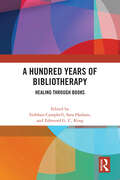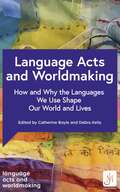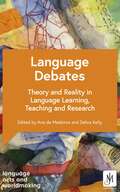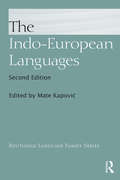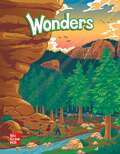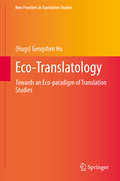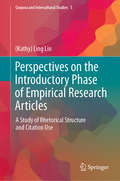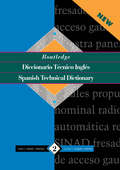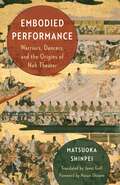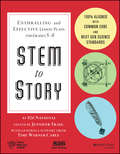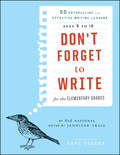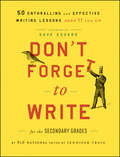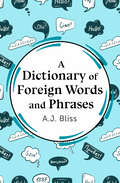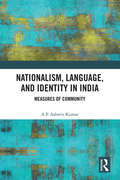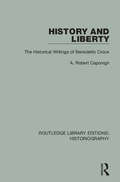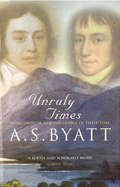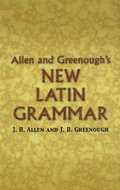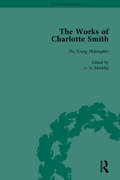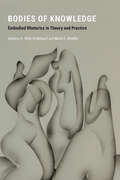- Table View
- List View
A Hundred Years of Bibliotherapy: Healing through Books
byThe First World War gave new and vital impetus to the ancient idea that books could heal. This interdisciplinary collection provides a targeted survey of 100 years of historical and contemporary understandings and practices of ‘the book as cure’.The contributors explore the curative practices of wartime reading, how they were developed and institutionalized after the war, and the afterlives of these ideas and practices today. Divided into three sections, the first considers bibliotherapy in World War I.’ It is rooted in the wartime cultures which ensured bibliotherapy became part of the active treatment of soldiers’ damaged minds and bodies on both sides of the Atlantic after 1914. Parts two and three examine the expanding variety of critical contexts, both historical and more modern, in which reading and wellbeing continued to intersect. The chapters draw on a wide range of source material from trench magazines to autograph books to e-novels, as well as on data and information drawn from practice-based encounters. They also provide the basis for further scholarly exploration of, for example, national traditions and contexts and the inter-disciplinary relationships which they inspire.A Hundred Years of Bibliotherapy: Healing through Books provides the first interdisciplinary dialogue on and account of bibliotherapy, addressing both historical and present-day modes of engaging with the ostensibly curative power of reading and reading cultures. It is an invaluable resource for scholars of literary studies, book history, and the medical humanities.
Language Acts and Worldmaking: How and Why the Languages We Use Shape Our World and Our Lives
byCollectively authored by the Language Acts and Worldmaking team, this defining volume offers reflective narratives on research, theory and practice over the course of the flagship project of the same name, funded by the Arts and Humanities Research Council's Open World Research Initiative. It returns to the project's key principles - that our words make worlds and we are agents in worldmaking - analyses the practices and outcomes of collaborative working, and looks to the future by offering concrete ideas for how the work they have done can now continue to do its work in the world.Focusing on the key research strands, this volume looks at the role of the language teacher as a mediator between languages and cultures, worldmaking in modern languages, translation and the imagination, languages and hospitality, digital mediations, and how words change and make worlds. Critically, it analyses the impact on communities of living in multilingual cities, and the ways in which learning a first language, and then a second, and so on, plays a crucial role in our ability to understand our culture in relation to others and to appreciate the ways in which they are intertwined.Specific aims are to: · propose new ways of bridging the gaps between those who teach and research languages and those who learn and use them in everyday contexts from the professional to the personal · put research into the hands of wider audiences · share a philosophy, policy and practice of language teaching and learning which turns research into action · provide the research, experience and data to enable informed debates on current issues and attitudes in language learning, teaching and research · share knowledge across and within all levels and experiences of language learning and teaching · showcase exciting new work that derives from different types of community activity and is of practical relevance to its audiences · disseminate new research in languages that engages with diverse communities of language practitioners.
Language Acts and Worldmaking: How and Why the Languages We Use Shape Our World and Our Lives
byCollectively authored by the Language Acts and Worldmaking team, this defining volume offers reflective narratives on research, theory and practice over the course of the flagship project of the same name, funded by the Arts and Humanities Research Council's Open World Research Initiative. It returns to the project's key principles - that our words make worlds and we are agents in worldmaking - analyses the practices and outcomes of collaborative working, and looks to the future by offering concrete ideas for how the work they have done can now continue to do its work in the world.Focusing on the key research strands, this volume looks at the role of the language teacher as a mediator between languages and cultures, worldmaking in modern languages, translation and the imagination, languages and hospitality, digital mediations, and how words change and make worlds. Critically, it analyses the impact on communities of living in multilingual cities, and the ways in which learning a first language, and then a second, and so on, plays a crucial role in our ability to understand our culture in relation to others and to appreciate the ways in which they are intertwined.Specific aims are to: · propose new ways of bridging the gaps between those who teach and research languages and those who learn and use them in everyday contexts from the professional to the personal · put research into the hands of wider audiences · share a philosophy, policy and practice of language teaching and learning which turns research into action · provide the research, experience and data to enable informed debates on current issues and attitudes in language learning, teaching and research · share knowledge across and within all levels and experiences of language learning and teaching · showcase exciting new work that derives from different types of community activity and is of practical relevance to its audiences · disseminate new research in languages that engages with diverse communities of language practitioners.
Language Debates: Theory and Reality in Language Learning, Teaching and Research (Language Acts and Worldmaking #1)
by VariousThis book captures an urgent moment for language teaching, learning and research. At its core are a series of debates concerning gender stereotyping, the place of linguistics in modern languages, language activism, multilingualism and modern languages and digital humanities. Taken together, these debates explore the work that languages, and that those who learn and speak them, do in the world as well as the way we think 'through' and 'in' a language and are shaped by it. Language Debates acknowledges the history of language teaching and the current realities of language teaching and learning. It is bold in suggesting ways forward for reform and for policy, setting languages and language learning at the heart of a consciously transformative set of goals. This book is therefore essential reading for academics, language teachers, policy makers, students, activists and those passionate about progressing language learning and teaching. The editors and contributors make up a multilingual and multicultural team who work across languages, cultures and borders with a globally-informed approach to their work. Uniquely, the debates in this volume are based on events with participants in the Language Acts and Worldmaking Debates Series and/or workshops within the wider research project and take into account the ensuing discussions there. Each debate is accompanied by an interview which serves as a model on how to continue the conversation beyond the printed pages of the book. You can also discover ways to join the debate through links on the Language Acts and Worldmaking series website (www.jmlanguages.com/languageacts) which includes recorded debates, additional materials and more information about the series. Like all the volumes in the Language Acts and Worldmaking series, the overall aim is two-fold: to challenge widely-held views about language learning as a neutral instrument of globalisation and to innovate and transform language research, teaching and learning, together with Modern Languages as an academic discipline, by foregrounding its unique form of cognition and critical engagement. Specific aims are to:· propose new ways of bridging the gaps between those who teach and research languages and those who learn and use them in everyday contexts from the professional to the personal· put research into the hands of wider audiences · share a philosophy, policy and practice of language teaching and learning which turns research into action· provide the research, experience and data to enable informed debates on current issues and attitudes in language learning, teaching and research· share knowledge across and within all levels and experiences of language learning and teaching· showcase exciting new work that derives from different types of community activity and is of practical relevance to its audiences · disseminate new research in languages that engages with diverse communities of language practitioners.
Language Debates: Theory and Reality in Language Learning, Teaching and Research (Language Acts and Worldmaking #1)
by VariousThis book captures an urgent moment for language teaching, learning and research. At its core are a series of debates concerning gender stereotyping, the place of linguistics in modern languages, language activism, multilingualism and modern languages and digital humanities. Taken together, these debates explore the work that languages, and that those who learn and speak them, do in the world as well as the way we think 'through' and 'in' a language and are shaped by it. Language Debates acknowledges the history of language teaching and the current realities of language teaching and learning. It is bold in suggesting ways forward for reform and for policy, setting languages and language learning at the heart of a consciously transformative set of goals. This book is therefore essential reading for academics, language teachers, policy makers, students, activists and those passionate about progressing language learning and teaching. The editors and contributors make up a multilingual and multicultural team who work across languages, cultures and borders with a globally-informed approach to their work. Uniquely, the debates in this volume are based on events with participants in the Language Acts and Worldmaking Debates Series and/or workshops within the wider research project and take into account the ensuing discussions there. Each debate is accompanied by an interview which serves as a model on how to continue the conversation beyond the printed pages of the book. You can also discover ways to join the debate through links on the Language Acts and Worldmaking series website (www.jmlanguages.com/languageacts) which includes recorded debates, additional materials and more information about the series. Like all the volumes in the Language Acts and Worldmaking series, the overall aim is two-fold: to challenge widely-held views about language learning as a neutral instrument of globalisation and to innovate and transform language research, teaching and learning, together with Modern Languages as an academic discipline, by foregrounding its unique form of cognition and critical engagement. Specific aims are to:· propose new ways of bridging the gaps between those who teach and research languages and those who learn and use them in everyday contexts from the professional to the personal· put research into the hands of wider audiences · share a philosophy, policy and practice of language teaching and learning which turns research into action· provide the research, experience and data to enable informed debates on current issues and attitudes in language learning, teaching and research· share knowledge across and within all levels and experiences of language learning and teaching· showcase exciting new work that derives from different types of community activity and is of practical relevance to its audiences · disseminate new research in languages that engages with diverse communities of language practitioners.
The Indo-European Languages
by Anna Giacalone Ramat Paolo Ramat Mate Kapovi 263The Indo-European Languages presents a comprehensive survey of the individual languages and language subgroups within this language family. With over four hundred languages and dialects and almost three billion native speakers, the Indo-European language family is the largest of the recognized language groups and includes most of the major current languages of Europe, the Iranian plateau and the Indian subcontinent. Written by an international team of experts, this comprehensive, single-volume tome presents in-depth discussions of the historical development and specialized linguistic features of the Indo-European languages. This unique resource remains the ideal reference for advanced undergraduate and postgraduate students of Indo-European linguistics and languages, but also for more experienced researchers looking for an up-to-date survey of separate Indo-European branches. It will be of interest to researchers and anyone with an interest in historical linguistics, linguistic anthropology and language development.
Eco-Translatology: Towards an Eco-paradigm of Translation Studies (New Frontiers in Translation Studies)
by (Hugs) Gengshen HuThis book offers a panoramic view of the emerging eco-paradigm of Translation Studies, known as Eco-Translatology, and presents a systematic study of the theoretical discourse from ecological perspectives in the field of Translation Studies. Eco-Translatology describes and interprets translation activities in terms of the ecological principles of Eco-holism, traditional Eastern eco-wisdom, and ‘Translation as Adaptation and Selection’. Further, Eco-Translatology approaches the phenomenon of translation as a broadly conceived eco-system in which the ideas of ‘Translation as Adaptation and Selection’, as well as translation as a ‘textual transplant’ promoting an ‘eco-balance’, are integrated into an all-encompassing vision. Lastly, Eco-Translatology reinforces contextual uniqueness, emphasizing the deep embeddedness of texts, translations, and the human agents involved in their production and reception in their own habitus. It is particularly encouraging, in this increasingly globalised world, to see a new paradigm sourced from East Asian traditions but with universal appeal and applications, and which adds to the diversity and plurality of global Translation Studies. This book, the first of its kind, will substantially expand the horizons of Translation Studies, a field that is still trying to define its own borders, and will open a wealth of new possibilities. Destined to become a milestone in the field of Translation, Interpretation and Adaptation Studies, as well as eco-criticism, it will introduce readers to a wholly new epistemological intervention in Translation Studies and therefore will open new vistas of thoughts, discussion and criticism.
Perspectives on the Introductory Phase of Empirical Research Articles: A Study of Rhetorical Structure and Citation Use (Corpora and Intercultural Studies #5)
by (Kathy) Ling LinCombining English for Specific Purposes (ESP) genre-based analysis, corpus-based language studies, and semi-structured interviews, this book represents the first multi-faceted project on the macro-structure of empirical research articles (ERAs) from both synchronic and diachronic perspectives, and on the “I+LR” patterned introductory phase (comprising two introductory sections, i.e., the Introduction and the Literature Review in RAs drawn from civil engineering and applied linguistics journals) regarding their rhetorical organization, use of citation, and structural and functional links and variations. The project comprises three logically interconnected studies using a multi-perspective (the cross-disciplinary, cross-generic, emic, and published advice vs. actual expert practices perspectives) approach. It will make a significant contribution to our understanding of the genre evolution, rhetorical organization and citation features of ERAs, enrich English for Academic Purposes (EAP) theories, and facilitate the development of EAP pedagogy and materials.
Routledge Spanish Technical Dictionary Diccionario tecnico inges: Volume 2: English-Spanish/ingles-Espanol (Routledge Bilingual Specialist Dictionaries)
by 0 Routledge,These 2 volumes consist of some 100,000 headwords in both Spanish and English, including 3,000 abbreviations. Terms are drawn from the whole range of modern applied science and technical terminology. These volumes can be purchased either separately or together in print. Each volume is compiled by an international team of subject terminologists, native English and Spanish speakers. Special attention is given to differences between UK and US terminology, and to Spanish and Latin-American variants. Over 70 subject areas are covered. Estos 2 volúmenes constan de unos 100.000 lemas tanto en español como en inglés, incluidas 3.000 abreviaturas. Los términos se extraen de toda la gama de terminología técnica y científica aplicada moderna. Estos volúmenes se pueden comprar por separado o juntos en forma impresa. Cada volumen es compilado por un equipo internacional de terminólogos temáticos, hablantes nativos de inglés y español. Se presta especial atención a las diferencias entre la terminología del Reino Unido y Estados Unidos, y a las variantes española y latinoamericana. Se cubren más de 70 áreas temáticas.
Embodied Performance: Warriors, Dancers, and the Origins of Noh Theater
by 1 Shinpei MatsuokaIn this groundbreaking book, Matsuoka Shinpei—a leading scholar of noh theater—provides a detailed account of the birth of one of Japan’s most celebrated art forms. Although noh has often been associated with the elite, Embodied Performance explores its links to a wider popular culture, revealing a rich and colorful public space where courtiers and commoners mingled.Matsuoka traces noh’s connections to popular and religious dances, linked verse, and chigo (beautiful temple boy) culture, emphasizing performance and the body. He describes the world of noh playwright Zeami as well as his views on dramaturgy and performance—and argues that Zeami was once a chigo. Matsuoka shows how religious rituals and cultural forms like ecstatic dance prayer and plays about demons in hell attracted people on the margins. Such activities, Matsuoka contends, drew on the tension between wild acrobatic movement and corporeal restraint, influencing the development of noh as well as the art of flower arranging and the tea ceremony. Janet Goff’s translation makes available in English a classic work of Japanese scholarship that will be invaluable to those interested in medieval Japanese culture, noh, and theatrical practice.
STEM to Story
by 826 NationalBring STEM to life for students with zombies, rockets, celebrities, and moreSTEM to Story: Enthralling and Effective Lesson Plans for Grades 5-8 inspires learning through fun, engaging, and meaningful lesson plans that fuse hands-on discovery in science, technology, engineering, and math (STEM) with creative writing. The workshop activities within the book are the innovative result of a partnership between 826 National's proven creative writing model and Time Warner Cable's Connect a Million Minds, an initiative dedicated to connecting young people to the wonders of STEM through hands-on learning. Authentically aligned with both the Common Core State Standards and the Next Generation Science Standards, this book provides teachers, after-school and out-of-school providers, and parents with field-tested lessons, workshops, and projects designed by professionals in each field. Including reflective observations by arts and science celebrities like Jon Scieszka, Mayim Bialik, and Steve Hockensmith, lessons feature bonus activities, fun facts, and teaching points for instructors at every level. These quirky, exploratory lessons will effectively awaken student imaginations and passions for both STEM and creative writing, encourage identity with scientific endeavors, and make both science and writing fun.Grades five through eight is the critical period for engaging students in STEM, and this book is designed specifically to appeal to - and engage - this age group. The guided curricula fosters hands-on discovery, deep learning, and rich inquiry skills while feeling more like play than school, and has proven popular and effective with both students and teachers.Awaken student imagination and get them excited about STEMFuse creative writing with STEM using hands-on activitiesMake scientific principles relevant to students' livesInspire students to explore STEM topics furtherThe demand for STEM workers is closely linked to global competitiveness, and a successful future in STEM depends upon an early introduction to the scientific mindset. The challenge for teachers is to break through students' preconceptions of STEM fields as "hard" or "boring," to show them that STEM is everywhere, it's relevant, and it's loads of fun. For proven lesson plans with just a dash of weird, STEM to Story is a dynamic resource, adaptable and applicable in school, after school, and at home.
Don't Forget to Write for the Elementary Grades
by 826 National StaffCreative strategies for getting young students excited about writing Don't Forget to Write for the Elementary Grades offers 50 creative writing lesson plans from the imaginative and highly acclaimed 826 National writing labs. Created as a resource to reach all students (even those most resistant to creative writing), the lessons range from goofy fun (like "The Other Toy Story: Make Your Toys Come to Life") to practical, from sports to science, music to mysteries. These lessons are written by experts, and favorite novelists, actors, and other celebrities pitched in too. Lessons are linked to the Common Core State Standards. A treasure trove of proven, field-tested lessons to teach writing skills Inventive and unique lessons will appeal to even the most difficult-to-reach students 826 National has locations in eight cities: San Francisco, New York, Los Angeles, Ann Arbor, Chicago, Seattle, Boston, and Washington DC 826 National is a nonprofit organization, founded by Dave Eggers, and committed to supporting teachers, publishing student work, and offering services for English language learners.
Don't Forget to Write for the Secondary Grades
by 826 National StaffFantastic strategies for getting high school students excited about writing This book offers 50 creative writing lesson plans from the imaginative and highly acclaimed 826 National writing labs. Created as a resource to reach all students (even those most resistant to creative writing), the off-beat and attention-grabbing lessons include such gems as "Literary Facebooks," where students create a mock Facebook profile based on their favorite literary character, as well as highly practical lessons like the "College Application Essay Boot Camp." These writing lessons are written by experts--and favorite novelists, actors, and other entertainers pitched in too. Road-tested lessons from a stellar national writing lab Inventive and unique lessons that will appeal to even the most difficult-to-reach students Includes a chart linking lessons to the Common Core State Standards 826 National is an organization committed to supporting teachers, publishing student work, and offering services for English language learners.
IsiZulu Soqobo Incwadi Yomfundi Ibanga 10 Contracted: UBC Contracted
by A B Mahlangu N F Mbhele S E ZuluLezi yizincwadi ezihlelelwe ukufundisa ulimi lwesiZulu emaBangeni 10-12 (Grade 10-12). Lezi zincwadi zibhalwe ngendlela yokulandela uhlelo lwemfundo yeNqubomgomo yesiTatimende soHlelo nokuHlola (NquTaHleHlo) (iCurriculum and Assessment Policy Statement – CAPS). Kulolu chungechunge lwezincwadi kukhona Incwadi KaThisha (Teacher Guide) neNcwadi Yomfundi (Learner Book).
IsiZulu Soqobo Incwadi Yomfundi Ibanga 10 Uncontracted: UBC Uncontracted
by A B Mahlangu N F Mbhele S E ZuluLezi yizincwadi ezihlelelwe ukufundisa ulimi lwesiZulu emaBangeni 10-12 (Grade 10-12). Lezi zincwadi zibhalwe ngendlela yokulandela uhlelo lwemfundo yeNqubomgomo yesiTatimende soHlelo nokuHlola (NquTaHleHlo) (iCurriculum and Assessment Policy Statement – CAPS). Kulolu chungechunge lwezincwadi kukhona Incwadi KaThisha (Teacher Guide) neNcwadi Yomfundi (Learner Book).
Get Up, Meg!
by Cindy Peattie Anne Stribling A Corazon AbiertoTitle contained within StartUp Phonic Core Program. Not Sold Separately
A Dictionary of Foreign Words and Phrases
by A J BlissA fascinating A-to-Z reference to foreign words and phrases that have become part of contemporary English usage. The English language has been greatly enriched by a vast array of words and phrases imported from other tongues, such as comrade, chateau, wunderkind, and vox populi. For the average English speaker, many are bound to be familiar. Some may even appear to be standard English, while others may seem, well,foreign. A Dictionary of Foreign Words and Phrases presents a comprehensive list of such terms, with entries that reveal their meanings and etymologies.
B is for Blue Crab: A Maryland Alphabet
by A Maryland Alphabet Shirley C. MenendezLocated just below the Mason-Dixon line, Maryland is flavored with both northern and southern culture and tradition. Defined by the largest estuary in the United States (The Chesapeake Bay), Maryland's historic sites/sights include capital city Annapolis and the U.S. Naval Academy, Muddy Creek Falls, and the running of the Preakness Stakes in Baltimore. Noteworthy residents include Harriet Tubman and Francis Scott Key.
Nationalism, Language and Identity in India: Measures of Community
by A P KumarThis book examines linguistic nationalism in India. It focuses on the emergence of language as a marker of identity by analysing themes such as Linguistic Reorganization of States, nationalism, philology, and linguistic identity. Formulating a novel conception of doxastic nature of community experience, the author presents a theory about nationalism as a cultural phenomenon by studying the constraints of western theological apparatuses that limit our understanding of it. The book looks at how an ecclesiastical notion of community is at the heart of the debate around linguistic and national identity – something that is redefining politics the world over. This volume will be useful for scholars and researchers of political studies, political sociology, sociology, historical linguistics and cultural studies.
History and Liberty: The Historical Writings of Benedetto Croce (Routledge Library Editions: Historiography)
by A R CaponigriA re-newed interest in, and appreciation of, the problems of history, both as the theory of historical process and as historiography became one of the marked characteristics of twentieth century thought and this book discusses Benedetto Croce’s historical writings in that context.
Unruly Times: Wordsworth and Coleridge in Their Time
by A S ByattUnruly Times is a superlative portrait of the relationship between Wordsworth and Coleridge, and a fascinating exploration of the Romantic Movement and the dramatic events that shaped it. With a novelist's insight and eye for detail, A. S. Byatt brings alive this tumultuous period and shows a deep understanding of the effects upon the minds of Wordsworth, Coleridge and their contemporaries - de Quincey, Lamb, Hazlitt, Byron and Keats.
Allen and Greenough's New Latin Grammar
by James B Greenough G. L. Kittredge Benj. L. D'Ooge A. A. Howard J. H. AllenA venerable resource for more than a century, Allen and Greenough's New Latin Grammar is still regarded by students and teachers as the finest Latin reference grammar available. Concise, comprehensive, and well organized, it is unrivaled in depth and clarity, placing a wealth of advice on usage, vocabulary, diction, composition, and syntax within easy reach of Latin scholars at all levels. This sourcebook's three-part treatment starts with words and forms, covering parts of speech, declensions, and conjugations. The second part, syntax, explores cases, moods, and tenses. The concluding section offers information on archaic usages, Latin verse, and prose composition, among other subjects. Extensive appendixes feature a glossary of terms and indexes. Students of history, religion, and literature will find lasting value in this modestly priced edition of a classic guide to Latin.
The Works of Charlotte Smith, Part II vol 10
by A. A. MarkleyCharlotte Turner Smith held a central position during the formative years of the British Romantic period. Smith's work includes eleven novels and two fictional adaptations from the French. This edition reveals the extent to which Smith's work in this form constitutes as significant an achievement as her poetry.
Bodies of Knowledge: Embodied Rhetorics in Theory and Practice
by Marie E. Moeller A. Abby KnoblauchBodies of Knowledge challenges homogenizing (mis)understandings of knowledge construction and provides a complex discussion of what happens when we do not attend to embodied rhetorical theories and practices. Because language is always a reflection of culture, to attempt to erase language and knowledge practices that reflect minoritized and historically excluded cultural experiences obscures the legitimacy of such experiences both within and outside the academy. The pieces in Bodies of Knowledge draw explicit attention to the impact of the body on text, the impact of the body in text, the impact of the body as text, and the impact of the body upon textual production. The contributors investigate embodied rhetorics through the lenses of race and ethnicity, gender and sexuality, disability and pain, technologies and ecologies, clothing and performance, and scent, silence, and touch. In doing so, they challenge the (false) notion that academic knowledge—that is, “real” knowledge—is disembodied and therefore presumed white, middle class, cis-het, able-bodied, and male. This collection lays bare how myriad bodies invent, construct, deliver, and experience the processes of knowledge building. Experts in the field of writing studies provide the necessary theoretical frameworks to better understand productive (and unproductive) uses of embodied rhetorics within the academy and in the larger social realm. To help meet the theoretical and pedagogical needs of the discipline, Bodies of Knowledge addresses embodied rhetorics and embodied writing more broadly though a rich, varied, and intersectional approach. These authors address larger questions around embodiment while considering the various impacts of the body on theories and practices of rhetoric and composition. Contributors: Scot Barnett, Margaret Booker, Katherine Bridgman, Sara DiCaglio, Kristie S. Fleckenstein, Vyshali Manivannan, Temptaous Mckoy, Julie Myatt, Julie Nelson, Ruth Osorio, Kate Pantelides, Caleb Pendygraft, Nadya Pittendrigh, Kellie Sharp-Hoskins, Anthony Stagliano, Megan Strom
